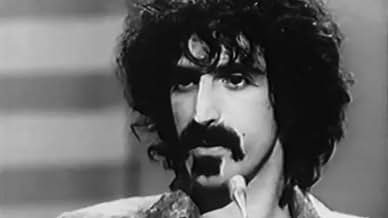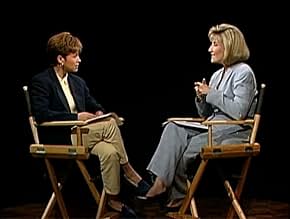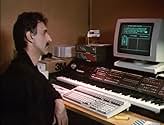IMDb RATING
7.5/10
1.4K
YOUR RATING
An in-depth look at the life and work of avant-garde musician, Frank Zappa.An in-depth look at the life and work of avant-garde musician, Frank Zappa.An in-depth look at the life and work of avant-garde musician, Frank Zappa.
- Awards
- 3 wins & 4 nominations total
Frank Zappa
- Self
- (archive footage)
Steve Allen
- Self
- (archive footage)
Chuck Ash
- Self - Pennsylvania State Police
- (archive footage)
- (as Trooper Chuck Ash)
Arthur Barrow
- Self
- (archive footage)
Adrian Belew
- Self
- (archive footage)
Theodore Bikel
- Rance Muhammitz
- (archive footage)
Jimmy Carl Black
- Self
- (archive footage)
Pierre Boulez
- Self
- (archive footage)
Thomas Braden
- Self
- (archive footage)
- (as Tom Braden)
Napoleon Murphy Brock
- Self
- (archive footage)
Tom Brokaw
- Self
- (archive footage)
Wally Bruner
- Self
- (archive footage)
Paul Carman
- Self
- (archive footage)
Del Casher
- Self
- (archive footage)
Connie Chung
- Self
- (archive footage)
Vinnie Colaiuta
- Self
- (archive footage)
Katie Couric
- Self
- (archive footage)
Featured reviews
There is no doubt that Frank Zappa was a genius, a cultural icon and an inspiration to many. Unfortunately this documentary is fairly forgettable.
The documentary relies almost completely on archive footage, from 1967 to just before Zappa's death in 1993. This comprises largely of concerts and interviews. This footage is informative and revealing. There is also lots of humour, either coming from Zappa himself or from his music.
The interviews however tended to reveal more about the media culture that Zappa lived in through the 60s, 70s and 80s than they revealed about the man himself. And although no doubt a very radical figure at the time, Zappa doesn't seem quite so radical when viewed from the year 2016.
The major flaw with the movie is that it lacks an emotional core; it lacks bite. We are simply shown a succession of footage with no great attempt to draw us in, or to tell a story. Zappa was a creative and outrageous figure, and yet this documentary of his life is fairly quiet and ultimately disappointing.
The documentary relies almost completely on archive footage, from 1967 to just before Zappa's death in 1993. This comprises largely of concerts and interviews. This footage is informative and revealing. There is also lots of humour, either coming from Zappa himself or from his music.
The interviews however tended to reveal more about the media culture that Zappa lived in through the 60s, 70s and 80s than they revealed about the man himself. And although no doubt a very radical figure at the time, Zappa doesn't seem quite so radical when viewed from the year 2016.
The major flaw with the movie is that it lacks an emotional core; it lacks bite. We are simply shown a succession of footage with no great attempt to draw us in, or to tell a story. Zappa was a creative and outrageous figure, and yet this documentary of his life is fairly quiet and ultimately disappointing.
Greetings again from the darkness. "More people know my face from a poster or a TV interview than have heard my music." It's an odd quote and one that probably doesn't fit any rock star other than Frank Zappa. Director Thorsten Schutte provides a no-frills look that is equal parts tribute for Zappa fans, and introduction to those who are unfamiliar with his life, words and work.
It's always been challenging to categorize or even describe the music of Frank Zappa and the Mothers of Invention. Rarely utilizing traditional melodies, "experimental" may come closest, though most of his 60 plus albums were lumped into the Rock section. It certainly wouldn't be considered mainstream, though he did have a cult like following for decades.
Schutte's straightforward documentary approach uses only existing concert footage and interviews with Zappa (across the years). Plenty of music is provided to allow any first time listeners a chance to get a feel, but it's Zappa's own words that are most fascinating. He is mostly an open book honest and forthcoming about his many opinions. He has been labeled as irreverent or offensive, but I prefer to view him as an observationalist or theorist and a highly intelligent and articulate one at that.
Should one doubt his commitment to the music, listening to him elaborate on the distinction between artistic and business decisions should end the debate. As a married man with 4 kids, it's enlightening (and surprising to some) to hear his editorials on drugs, the music business, the media, and even politics. Many will remember his Senate battles going head to head versus Tipper Gore in her quest for warning labels on music. Zappa viewed this as censorship and eloquently stated the case as protection for artistic freedom. Schutte presents not just footage from the hearings, but also follow up interviews that Zappa participated in.
He died of prostate cancer in 1993, and his band was an ever-changing ensemble over the years, but Frank Zappa never shied away from speaking out against attempts to stifle the rights of artists, and he was a trail-blazer in utilizing a computer for composing music. He also directed films and videos, wrote editorials, and in a fascinating development, was hired as a cultural consultant for Prague yet another piece of the unique life and career of Frank Zappa. "For Gail" indeed.
It's always been challenging to categorize or even describe the music of Frank Zappa and the Mothers of Invention. Rarely utilizing traditional melodies, "experimental" may come closest, though most of his 60 plus albums were lumped into the Rock section. It certainly wouldn't be considered mainstream, though he did have a cult like following for decades.
Schutte's straightforward documentary approach uses only existing concert footage and interviews with Zappa (across the years). Plenty of music is provided to allow any first time listeners a chance to get a feel, but it's Zappa's own words that are most fascinating. He is mostly an open book honest and forthcoming about his many opinions. He has been labeled as irreverent or offensive, but I prefer to view him as an observationalist or theorist and a highly intelligent and articulate one at that.
Should one doubt his commitment to the music, listening to him elaborate on the distinction between artistic and business decisions should end the debate. As a married man with 4 kids, it's enlightening (and surprising to some) to hear his editorials on drugs, the music business, the media, and even politics. Many will remember his Senate battles going head to head versus Tipper Gore in her quest for warning labels on music. Zappa viewed this as censorship and eloquently stated the case as protection for artistic freedom. Schutte presents not just footage from the hearings, but also follow up interviews that Zappa participated in.
He died of prostate cancer in 1993, and his band was an ever-changing ensemble over the years, but Frank Zappa never shied away from speaking out against attempts to stifle the rights of artists, and he was a trail-blazer in utilizing a computer for composing music. He also directed films and videos, wrote editorials, and in a fascinating development, was hired as a cultural consultant for Prague yet another piece of the unique life and career of Frank Zappa. "For Gail" indeed.
Great review, read the entire piece. As a Zappa fan, who has seen Frank perform many times, I can't wait to see it. Only one thing wrong, the comment regarding the Right Wing suppressing free speech. As a life- long liberal, I am appalled at my left winger friends succumbing to political correctness and forcing it down all others' throats. They have now become the new-fascists. Just look at the lectures at our universities being shut down. Everything is now targeted to be shut down unless it conveys the new liberal mentality. Frank would never be behind this mentality of social control. Big Brother has arrived, and guess what. He didn't come from the Right...But, still, a very good review. Good job.
Eat this Review
"Eat That Question: Frank Zappa in his Own Words" is a film about the musical iconoclast, composer and entrepreneur, Frank Zappa. The film is mainly Zappa in his own words and his words are almost as entertaining as his compositions. The film also has a lot of footage of him playing live. Unlike the U.S., Zappa was a celebrity in Europe. Thus, many of the interviews are from European shows. In fact, his song Bobby Brown, despite its 'lewdness' in English, was a number one hit in Norway and Sweden.
The film illuminates Zappa and shows his combative style as well as his creative talents. As a musician, he wrote everything from blues to classical to jazz to standard rock. All the while, he mocked musical styles he thinks of as trite such as disco, psychedelia and new wave. In one scene, Zappa mocks Devo music with an imitation of part of Devo's hit, Whip It. What Zappa seems to not know is that Devo would have absolutely agreed with Zappa's critique of music and pop culture. And that is why many love Zappa, his willing to challenge convention and critique everything.
He talks about free speech and freedom, he calls himself a conservative and a composer, he is proud to "have four kids" and brags that he pays his mortgage and pays taxes like any American. He has no patience for "terrible music" and people who are sell outs. There are many noteworthy quotes in the film. He hates the record industry for messing with his music and preventing him from making money off of his talent and music in generally, but one senses that if he could rid the world of music he hates, he might just do that.
I would have liked to hear him talk more about music he likes and dislikes and some of his other influences more than the one scene where he lists classical artist he likes and have influenced him such as Stravinsky and Bartók. Did he like Dylan, Miles Davis, punk rock, or rap music? Perhaps these questions weren't in the vault anywhere. But the questions are intriguing given the interviews that were in the film.
Rating: Pay full price
Interviews and live music from one of the most interesting musicians of the 20th Century makes for one interesting film.
Peace, Tex Shelters
"Eat That Question: Frank Zappa in his Own Words" is a film about the musical iconoclast, composer and entrepreneur, Frank Zappa. The film is mainly Zappa in his own words and his words are almost as entertaining as his compositions. The film also has a lot of footage of him playing live. Unlike the U.S., Zappa was a celebrity in Europe. Thus, many of the interviews are from European shows. In fact, his song Bobby Brown, despite its 'lewdness' in English, was a number one hit in Norway and Sweden.
The film illuminates Zappa and shows his combative style as well as his creative talents. As a musician, he wrote everything from blues to classical to jazz to standard rock. All the while, he mocked musical styles he thinks of as trite such as disco, psychedelia and new wave. In one scene, Zappa mocks Devo music with an imitation of part of Devo's hit, Whip It. What Zappa seems to not know is that Devo would have absolutely agreed with Zappa's critique of music and pop culture. And that is why many love Zappa, his willing to challenge convention and critique everything.
He talks about free speech and freedom, he calls himself a conservative and a composer, he is proud to "have four kids" and brags that he pays his mortgage and pays taxes like any American. He has no patience for "terrible music" and people who are sell outs. There are many noteworthy quotes in the film. He hates the record industry for messing with his music and preventing him from making money off of his talent and music in generally, but one senses that if he could rid the world of music he hates, he might just do that.
I would have liked to hear him talk more about music he likes and dislikes and some of his other influences more than the one scene where he lists classical artist he likes and have influenced him such as Stravinsky and Bartók. Did he like Dylan, Miles Davis, punk rock, or rap music? Perhaps these questions weren't in the vault anywhere. But the questions are intriguing given the interviews that were in the film.
Rating: Pay full price
Interviews and live music from one of the most interesting musicians of the 20th Century makes for one interesting film.
Peace, Tex Shelters
I can't say I am the kind of Zappa fan who has all this albums. In fact, I have very few Zappa Albums and like very few of the tunes. But I always loved Zappa as a personality.
He was a fascinating dude and it's ashame that his kids are fighting over his legacy. It's also ashamed what happened to he and Don VanVliet.
Anyway, I enjoyed listening to the clips in this film. Don't expect to learn a real lot about Zappa. Just sit back and enjoy Zappa's pontifications.
He was a fascinating dude and it's ashame that his kids are fighting over his legacy. It's also ashamed what happened to he and Don VanVliet.
Anyway, I enjoyed listening to the clips in this film. Don't expect to learn a real lot about Zappa. Just sit back and enjoy Zappa's pontifications.
Did you know
- Quotes
[last lines]
Frank Zappa: You're 18. Take the spoon out of your nose, take the needle out of your arm, take the beer out of your mouth, and go vote. You know what I mean? Vote. Register and vote like a beast.
- Crazy creditsThere is a final bit of footage at the end of the closing credits where Zappa encourages young people to vote.
- ConnectionsEdited into Zapped: Frank Zappa par Frank Zappa (2016)
Details
- Release date
- Countries of origin
- Official site
- Language
- Also known as
- Zapped - Frank Zappa par Frank Zappa
- Filming locations
- Prague, Czech Republic(Zappa meeting Václav Havel)
- Production companies
- See more company credits at IMDbPro
Box office
- Gross US & Canada
- $355,074
- Opening weekend US & Canada
- $16,695
- Jun 26, 2016
- Gross worldwide
- $365,540
- Runtime
- 1h 33m(93 min)
- Color
- Aspect ratio
- 1.33 : 1
Contribute to this page
Suggest an edit or add missing content


































